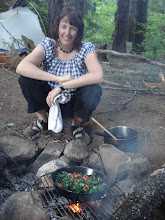Given that my thesis is on what part engagements with multicultural foodways play in the development of a cosmopolitan society, I'm pretty excited that New Matilda published my article today, which they titled: Is There Life Beyond the Barbie? The article explores Australia's fascination with its national identity via a national dish.
Although it's a short article written for an intelligent but non-academic audience, it's given me a lot of ideas, maybe even (gasp!) chapter ideas. I'm particularly interested in pursuing something I've been working on the past six months, which is about the importance of the maintenance of vernacular food cultures to sustain a lively cosmopolitan society. That is, if Australia's diverse foodways became a) all culinarily Anglicised, or b) hybridised to the point that hybrid becomes the new homogeneous, then we all lose opportunities for 'openness to the Other' that currently exist.
Zoe's excellent post, 'On sneaky racism and other culinary horrors', explores some of these issues, as do the plentiful comments she's received. Zoe's the kind of global citizen I believe we should all strive to be (maybe one day, we won't have to strive, because it will all come so naturally?), one who isn't afraid to engage with others, irrespective of culture or class, even when she's outside her comfort zone. She's not afraid to admit she doesn't understand something and ask for help, and similarly, she's willing to try new things and discover firsthand whether she likes them or not. Her post and the follow-up commentors are all symptomatic of a thriving cosmopolitan community out there (and yes, I recognise they are unlikely to be the majority of Australians, but they do give one hope).
And yet, while all of this engagement and diversity is fascinating, and, in my opinion, welcome, it makes it difficult to maintain a 'national imaginary' as per Benedict Anderson (1983). Anderson's argument is that the national imaginary was made possible by a broadly shared vernacular in print capitalism. Until then, nations had been 'unimaginable' due to a sort of Tower of Babel problem. And Anderson rightfully points to a number of benefits of national belonging, arguing that it more often creates something to 'fight for' rather than against - something to which people feel passionately attached that is much larger than themselves, and which is expressed through music, literature, and perhaps, food.
As someone who has never felt comfortable with nationalism (given my early exposure to its rabid cousin, patriotism), as I tend to read it more as a mechanism of exclusion than inclusion, I struggle with Anderson's optimism. On the other hand, my entire project is about trying to understand how the diverse population of Australia can find a meaningful sense of belonging to each other and the world, and how we are or aren't using food in that search. So really, I guess I'm a bit of a closet nationalist?
But to return to the problem of vernaculars (when there are many) and how they relate to both nationalism and cosmopolitanism. How can people imagine themselves into something collective from such wildly disparate food cultures (and, of course, the many other aspects of culture, but my primary concern is, as you know, food)? If that 'something' to which they are imagining themselves is cosmopolitanism, it makes perfect sense. If it's nationalism, not so much. And yet without the broader recognition of ourselves as Australian, is it really possible to imagine ourselves further into the world?
As is appropriate for a PhD candidate halfway through my degree, I will leave these thoughts with those few gestures for now... (that is, I'm not really sure where I'm going with this just yet, and I have formed no conclusions.) heh. pax.
Subscribe to:
Post Comments (Atom)

2 comments:
Interesting thoughts. I too shy away from nationalism but love the idea of national food. Maybe though the idea isn't really valid or meaningful in the modern world. Maybe we're too global to be truly national in our food now?
Or maybe I just can't deal with the idea that there's such a thing as a national dish. We're far too influenced by multiculturalism.
I mean, such a thing as a national dish IN AUSTRALIA. No such thing.
Post a Comment